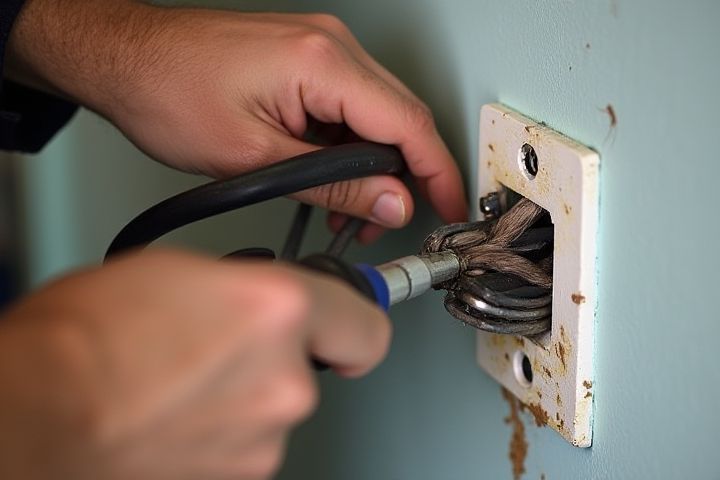
Inspecting the current wiring system is essential for identifying outdated components and safety hazards. Upgrading to modern electrical panels can enhance your home's energy efficiency and accommodate higher power demands. Installing LED lighting throughout your space reduces energy consumption while providing better illumination. Implementing smart home technology allows for enhanced control over your electrical systems, providing convenience and potentially lowering energy bills. Hiring a licensed electrician ensures that any upgrades or repairs meet local codes and industry standards for safety and reliability.
How To Improve House Wiring
Understand electrical codes
Understanding electrical codes is critical for ensuring safe house wiring. Familiarize yourself with the National Electrical Code (NEC) requirements, which dictate standards for installations, outlets, and circuit protection. Regularly consulting local codes can help you maintain compliance, as they may have additional requirements beyond the NEC. Learning about grounding, circuit breakers, and proper wire sizing will not only enhance safety but also improve the efficiency of your electrical systems.
Upgrade to modern wiring materials
Upgrading to modern wiring materials, such as copper or aluminum conductors, significantly enhances your home's electrical efficiency and safety. Copper, for instance, offers superior conductivity, reducing energy loss, and is less prone to corrosion than older materials. Implementing PVC or non-metallic sheathing can also provide increased protection against environmental factors, leading to a longer lifespan of your home's wiring. Investing in these modern materials not only elevates your home's value but also ensures compliance with current electrical codes, promoting safer living conditions.
Install additional circuits for high-load appliances
Installing additional circuits for high-load appliances is crucial for enhancing your home's electrical safety and efficiency. Begin by evaluating the electrical panel to ensure it can accommodate the added load and number of circuits. After confirming the panel's capacity, engage a qualified electrician to run dedicated circuits for appliances such as refrigerators, ovens, and HVAC systems, minimizing the risk of circuit overload. This upgrade not only enhances your appliance performance but also contributes to a safer living environment by reducing the chance of electrical fires.
Use GFCIs in wet areas
To enhance your home's wiring safety, especially in wet areas like bathrooms and kitchens, install Ground Fault Circuit Interrupters (GFCIs). These devices continuously monitor electrical currents and quickly cut off power if they detect a ground fault, significantly reducing the risk of electric shock. When installing GFCIs, ensure they are placed near all sources of water, including sinks and outdoor outlets, as this safeguard is essential for protecting you and your family. Regularly test your GFCIs to ensure their functionality; simply press the "test" button monthly to confirm they trip as expected.
Properly label circuit breakers
Properly labeling circuit breakers is essential for effective house wiring management, significantly enhancing safety and efficiency. By using clear, concise labels, you ensure that each breaker corresponds to its specific circuit, which can prevent confusion during electrical maintenance or emergencies. It's recommended to update labels whenever circuit modifications are made, ideally using a label maker for uniformity and readability. A comprehensive labeling system can save you time and reduce risk, enabling quick identification of the circuits controlling critical appliances and outlets in your home.
Ensure proper grounding
Proper grounding is essential for electrical safety in your home, preventing electric shocks and ensuring the efficient operation of your electrical system. Start by checking if your outlets have a grounding connection, which can be verified using a socket tester. Ensuring that your main grounding electrode system is connected to a grounded metal rod buried in moist soil enhances the safety of your wiring. Consider enlisting a licensed electrician to inspect and upgrade your home's grounding system to meet current electrical codes and standards for optimal performance.
Opt for energy-efficient lighting
Opt for energy-efficient lighting options, such as LED bulbs, which consume significantly less energy than traditional incandescent bulbs while providing brighter illumination. You can enhance the overall aesthetic of your home by choosing fixtures that complement your interior design while ensuring they meet energy consumption standards. Incorporating dimmer switches allows you to adjust brightness according to the time of day or activity, further optimizing energy use. By upgrading your home's wiring to accommodate smart lighting systems, you enable remote control and automation, resulting in additional savings on your electricity bill.
Consider smart home wiring options
Upgrading your house wiring to include smart home options enhances efficiency and convenience. Integrating smart lighting systems allows for remote control and automation, adjusting the ambiance based on your preferences. Smart thermostats can optimize energy usage by learning your routines, resulting in cost savings. Investing in structured wiring solutions ensures that broadband connectivity supports all your smart devices seamlessly throughout your home.
Hire a licensed electrician for major upgrades
Hiring a licensed electrician for major upgrades in house wiring ensures compliance with local codes and standards. These professionals possess the expertise to assess your current electrical system and recommend necessary improvements that enhance safety and efficiency. Utilizing a licensed electrician also reduces the risk of electrical hazards, such as short circuits or overloads, which can lead to costly repairs or dangerous situations. By prioritizing experienced electricians, you can ensure that your electrical upgrades are performed correctly and reliably, providing peace of mind for your home's safety.
Conduct regular maintenance checks
Conducting regular maintenance checks on your house wiring is essential for ensuring safety and efficiency. Inspect wiring for signs of wear, such as fraying or discoloration, and replace any faulty materials immediately to prevent electrical hazards. Utilize a multimeter to test voltage levels; a reading outside the standard range of 110-120 volts in North America could indicate underlying issues. You should also consider hiring a licensed electrician for comprehensive inspections every few years, which can identify potential problems before they escalate and help maintain optimal functionality.
